Do you have anger issues? Do you feel constantly angry and barely keep yourself from losing it? Do you feel the anger boiling inside you for no apparent reason? Is your uncontrollable rage making you feel helpless?
Anger is a natural human emotion that can be healthy when regulated in time. However, if you feel constantly angry and out of control, then it can seriously affect your relationships, career and personal life. This is why it’s crucial that you learn why you feel so angry all the time and what you can do about it.
Anger Controls You When You Don’t Control Anger
You start grinding your teeth, tense your jaw and clench your fists. Your breathing becomes shallow, your body temperature rises and your heart beats faster. Your mind stops working and all you want to do is punch through the walls (or people), break things and destroy everything around you. Yeah, I know the feeling and I also know how overwhelming it can feel. When you have anger problems, your life becomes engulfed in the darkness of your rage. You may feel you can control your emotions, you can blame everyone else around you, you can scream, shout and punch all you want. But in the end, it is your own life that is jeopardized by your anger.
Rage and frustration is part of our daily lives, but when it gets out of control it can affect your thoughts, emotions, behaviors and health. It can lead to bad behavior in the workplace, abuse or domestic violence in personal relationships and even problems with the law. When you don’t work on resolving your frustration, it leads to stress, irritation, restlessness and even depression and obsessive compulsive disorder (OCD). Suppressed and unresolved frustration can make you short-tempered and make you snap at any time, even at your loved ones. Uncontrollable, excessive and chronic anger can take you in a downward spiral where you can end up hurting yourself the most.
Feeling angry all the time for no particular reason can seriously affect all aspects of your life unless you identify the triggers, analyze underlying causes and learn effective coping strategies.
Related: How Unexpressed Anger Impacts Your Mind
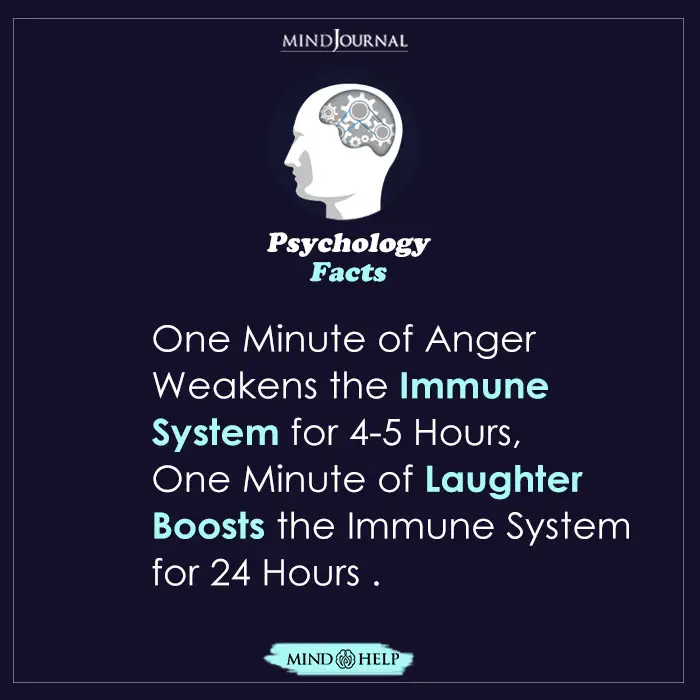
Anger Is Healthy, Uncontrollable Anger Is Not
Anger is a basic human emotion marked by hostility and enmity towards a situation, an event, a thing or a person. It is a reaction we experience when we feel that we have been intentionally wronged. Being angry is a part of our “fight, flight, or freeze” response and serves an important function by protecting and keeping us safe from dangers and threats. It signals our mind and body to gear up for a confrontation or a fight. Research reveals that it guides “many aspects of human conduct” and influences the development of one’s personality. However, excessive, uncontrolled and unresolved anger can lead to various adverse effects and negatively affect our health.
Researchers often consider anger and aggression a serious medical problem that is associated with medical, neurologic and or psychiatric disorders. Studies show that you will be more likely to experience inflammation, which can lead to the onset of chronic diseases, if you are more prone to experience extreme rage. It can also increase our blood pressure, cloud our judgment and decision making and strongly affect our mental health. One 2016 study shows that aggression is a key factor in the development of different psychological disorders.
So if you feel angry almost all the time and are unable to manage it, then it’s time you become more aware of your thoughts and emotions. But that doesn’t mean you are the only person who feels like that. According to a 2015 study, “The overall prevalence of inappropriate, intense, or poorly controlled anger in the U.S. population was 7.8%.” Moreover, this basic emotion is more common among men and younger adults and leads to “decreased psychosocial functioning.” This is why scientific literature has extensively studied the association between “anger, hostility and aggressiveness and various health risks.” In fact, even in Buddhism, rage and hatred (along with ignorance and greed) are referred to as one of the Three Poisons of the Mind.
Related: Anger And Irritability: The Lesser Known Symptoms Of Depression
What Triggers Anger
This basic human emotion can be triggered by a number of reasons and factors that may be associated with unresolved, unaddressed and underlying issues. Some common triggers that make us angry may include –
- Excessive stress, panic, tension or anxiety
- Being frightened, threatened, attacked, harmed or violated
- Being treated wrongfully, deceived or disrespected
- Issues related to personal life
- Normal daily stressors, like traffic
- Memories of adverse or traumatic experiences from the past
- Issues created by other individuals
- Sleep deprivation
- Hunger or starvation
- Being powerless or hopeless
- Psychological or physical conditions, like depression or chronic pain
- External factors, like environment
- Inability to pursue or achieve goals due to external causes
- Financial strain
- Family or relationship problems
- Other negative life circumstances
Apart from these, certain hormonal changes and psychiatric disorders can also result in excessive anger. Grief and bereavement can also make us feel angry as coping with losing a loved one is difficult, yet unique for each one of us. But why do you feel angry all the time? Once you understand the common triggers of anger you are better able to identify the underlying causes of your uncontrollable rage.

Why Do You Get Angry For No Reason?
What is it that makes you lose your temper for no reason at all? Is it due to past trauma? Do you have emotion regulation problems? Or are you dissatisfied with your life? Identifying the reason for chronic anger and frustration is an essential step in learning to control it. Here are some of the probable reasons why you feel so frustrated and furious at all times –
1. You suffer from psychiatric disorders
Studies show that anger and aggression are commonly experienced by psychiatric patients and can adversely affect one’s emotional state. Aggression is associated with a wide range of mental health conditions, such as –
- Anxiety
- Depression
- Intermittent explosive disorder
- Schizophrenia
- Bipolar disorder
- Borderline personality disorder (BPD)
- Post Traumatic Stress Disorder (PTSD)
- Attention deficit hyperactivity disorder (ADHD)
- Obsessive compulsive disorder (OCD)
- Substance use disorder (drug addiction)
- Premenstrual dysphoric disorder (PMDD)
According to a 2009 study, “In the DSM, frequent episodes of rage and aggression have defined a number of personality and problematic behavior disorders.” The study adds that the Diagnostic and Statistical Manual of Mental Disorders (DSM) by the American Psychiatric Association states irritability and anger as a descriptor of varied disorders such as schizoaffective disorder, antisocial personality disorder, pathological gambling and nicotine withdrawal, along with the conditions mentioned above. It is also observed in Oppositional Defiant Disorder as patients “often lose temper” and get “easily annoyed by others.” So if you tend to get angry easily, then it may be due to some underlying psychological issues. It is best to consult a healthcare professional for a proper diagnosis.
Related: When Depression Is a Symptom of Buried Anger: Here’s How To Heal It
2. You have low self-esteem
According to research, the expression of anger is closely associated with one’s level of self-esteem. One study explains “low self-esteem individuals report more anger, but have fewer expressive outlets than do individuals with more favorable self-concepts.” Having a low sense of self-worth and low self-esteem can lead to aggressive and passive aggressive behaviors. Hence, you tend to be seriously angry when your emotions and opinions are not validated or valued. Such individuals can also become defensive and frustrated when they become self-conscious or are criticized, humiliated, diminished or victimized.
A lack of self esteem makes us believe that we are not worthy of being loved. That we are worthless, undeserving and never good enough. It makes us vulnerable to being easily emotionally hurt by others and influences how we see ourselves. However, this constant feeling of being a failure and worthless can make us feel easily frustrated which is expressed through aggressive reactions. Researchers from a 1989 study found that stability of self-esteem and level of self-esteem act as predictors of anger and hostility. So if you find yourself constantly criticizing or insulting others as an unhealthy and toxic strategy to boost your self-esteem, then you may need to seek help for anger management problems.
3. You ignore your own wants and needs
When we lack assertiveness and our emotional needs are left unfulfilled and unmet, we can feel emotionally starved. This can make us feel disappointed, overwhelmed, ignored, neglected, unwanted, empty, inadequate and lonely. All these negative feelings can then give rise to chronic anger which may burst out at the most inappropriate times. So if you are unable to be assertive about your needs or minimize them, you will eventually become defensive. You may tell yourself that your needs don’t matter or pretend that you don’t have any unfulfilled needs, but this will only make you more irritable. You will become more demanding, pick fights easily and seek attention constantly when you feel emotionally unfulfilled.
According to a recent 2020 study, assertiveness is considered as a “learned behaviour that occupies an uncomfortable space between passive and aggressive communication.” Lacking assertiveness prevents us from speaking up about our rights. You may feel it is wrong to ask for what you want, however, repeatedly ignoring your needs and wants makes you chronically frustrated. When you are unable to say no, stand up for your rights and afraid to ask for what you need, aggression seeps in. Sadly, we are often programmed to put our own needs in the backseat and give preference & priority to those of others. This self-sacrificing, martyrdom mindset, coupled with the forced habit of being nice and accommodating, leads to constant negative emotions and moods. Now being nice and sacrificing for your loved ones is not necessarily wrong, but when you put others ahead of your own needs in the long run, it can significantly damage your emotional health and your ability to be positive.
Related: The Dangers of Playing It Safe and How to Overcome the Fear of Self-Expression

4. You use it as a defense mechanism
Do you tend to hide your emotional pain, fear and sadness and express it as anger instead? Most of us, especially men, do not feel comfortable appearing vulnerable and weak before others. Hence, we try to suppress feelings like sadness and grief and divert our attention towards our work, or use substances or casual sex as a distraction. Unrealistic expectations, illogical beliefs and painful memories can cause anger when you decide to hide them, whether consciously or subconsciously. The pain that still remains inside you starts to affect your thoughts and behaviors leading you to use your rage as a defense mechanism. However, the more we try to avoid our actual feelings, the more frustrated we become which eventually turns to uncontrollable rage. Studies show that hostility, anger and aggression are commonly observed in people with depression.
By using this emotion as a coping strategy you direct your frustrations towards non-threatening things or innocent people. As the pain inside you makes you feel uncomfortable, you want to make others feel this unpleasant pain as well. But this can often make you feel ashamed and guilty as you know your emotions are unregulated and misdirected, which can lead to further stress and frustration. Yet we keep using anger as it helps us feel powerful and in charge. It makes us believe that we are NOT broken from inside, even though it is far from the truth.
5. You feel powerless
For most of us, anger can rear its ugly head when we are unable to control our own lives and we have to live according to the wishes of others. When we lack the power to drive and lead our life, it affects our sense of self worth and self identity. It makes us feel helpless, invisible, vulnerable, unacknowledged, worthless and unappreciated. This can have a direct effect on our relationships as we try to counter these negative emotions by being defensive and showing aggression to our parents, partner, children or even coworkers. What’s worse, such feelings of helplessness and hopelessness can lead to symptoms of anxiety and depressive disorders.
Intense feelings of powerlessness or helplessness are often experienced when we are forced to do things we don’t want to, experiencing health issues, trapped in a toxic relationship, grieving the loss of a loved one or other traumatic experiences. However, being angry allows us to boost our ego and feel powerful. It acts as a “positive” force that enables us to feel strong, important and influential. And as it makes us feel “positive”, even if only for a short while, it tends to become a habit in coping with feelings of powerlessness. So if feeling vulnerable and invisible makes you feel angry more than sad, then you are masking your real emotions with aggression. In fact, such feelings of chronic helplessness and anger can be “detrimental to good psychological health.”
Related: How To Deal With Anger So As Not To Offend Your Partner
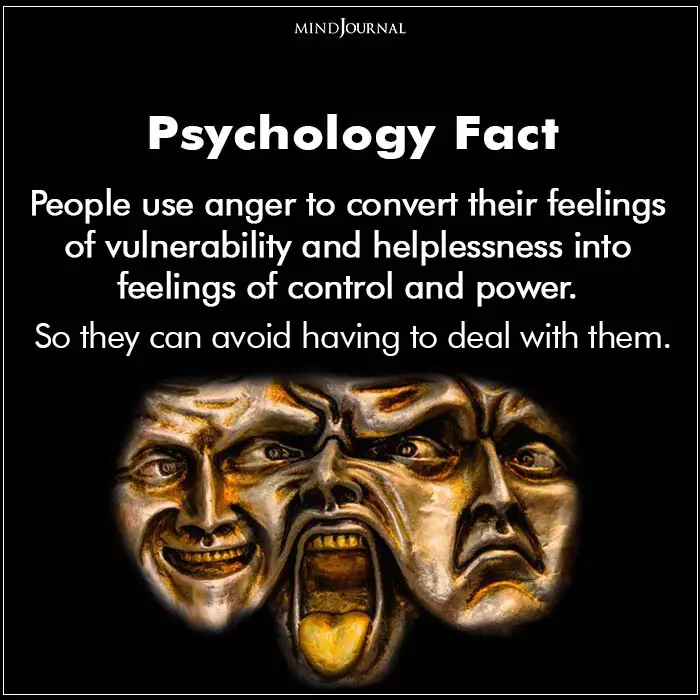
How To Manage Chronic Frustration And Anger
If you repeatedly tend to become angry for no apparent reason, then there are certain self-help strategies that can help you to better control your emotions and reactions. Some of them are mentioned below –
1. Be aware of shifts in your thoughts, emotions and behavior and learn to identify warning signs early.
2. Focus more on responding to someone than reacting to them and the best way to do that is by taking a break. Pause and take a walk for a short while to feel more in control.
3. Relax your body and release tension by dropping your shoulders, unclenching your jaw, loosening your arms and legs. Slowly count to ten to refocus your mind.
4. Learn to be more assertive and express your needs and emotions clearly without judging or blaming others.
5. Practice relaxation techniques like deep breathing, meditation, yoga and progressive muscle relaxation to relieve stress, anxiety, depression and anger.
6. Talk to a trusted loved one about your concerns and do not hesitate to seek help. Talking to someone can help you gain a new perspective on how you are approaching issues.
7. Be physically active and exercise regularly. You should also practice good sleep hygiene and eat a nutritious meal. Make sure to avoid excessive coffee, alcohol and substances.
8. Seek medical support. Talk to a doctor or a therapist about your issues and seek treatment, if needed. Studies have found that cognitive therapy can be effective for anger management.
Related: 13 Practical Strategies To Handle Being Mad or Angry
Think Before Acting Out
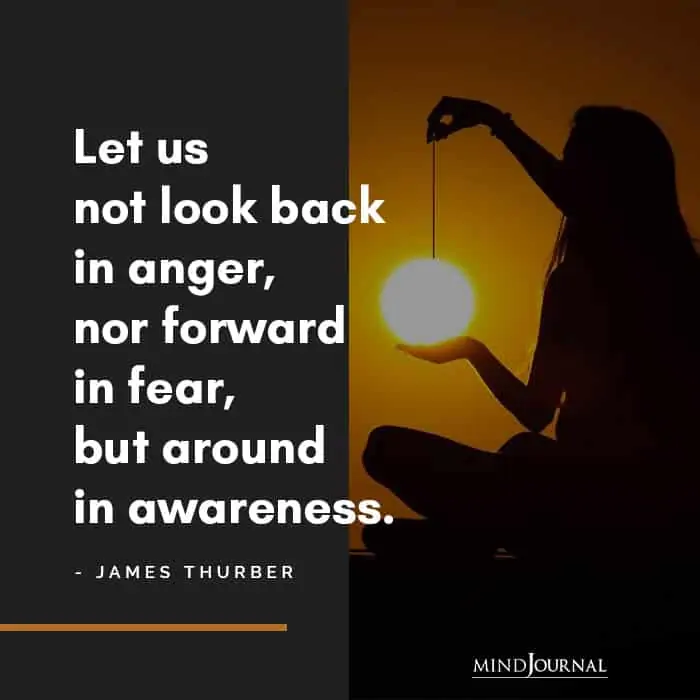
When you are angry, it is easy to react and let all your anger out. But, as you know already, it harms you more than it hurts others. So make sure to think before reacting. Express your anger in a healthy way after you have calmed down and feel more in control. Openly talk about your needs and concerns without putting others down. And then focus on how you can solve the problem at hand and meet your needs better.
Anger is a natural emotion but when it gets out of hand, it can not only affect our relationships but also our health. So make sure to consult a healthcare professional and seek help, if needed. However, being aware of your anger issues is the first step to recovery and you have taken that right now. So congratulations!
Now take one step at a time and heal yourself.
Related: Anger Management 101 and Beyond

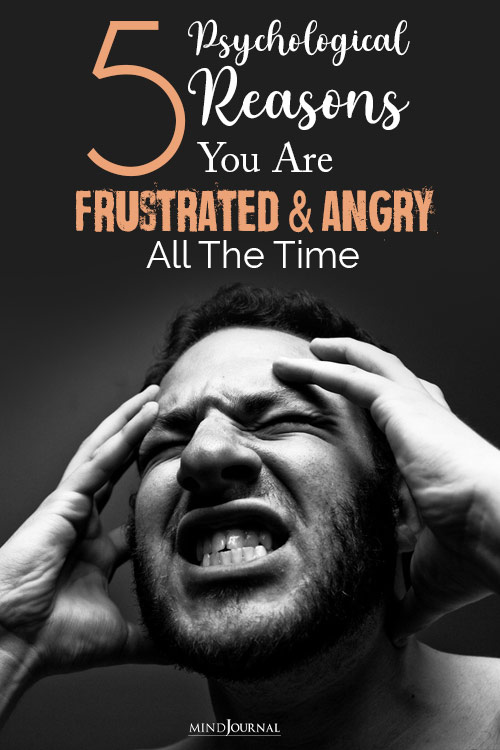
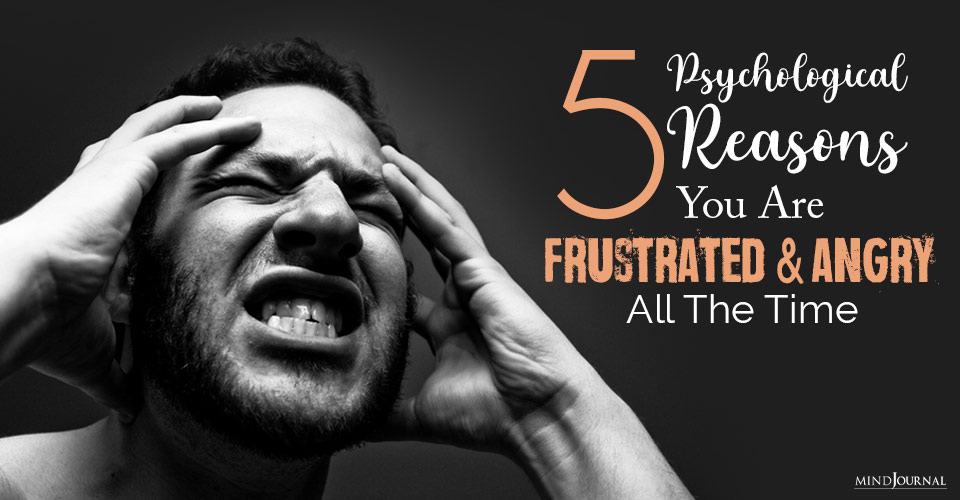






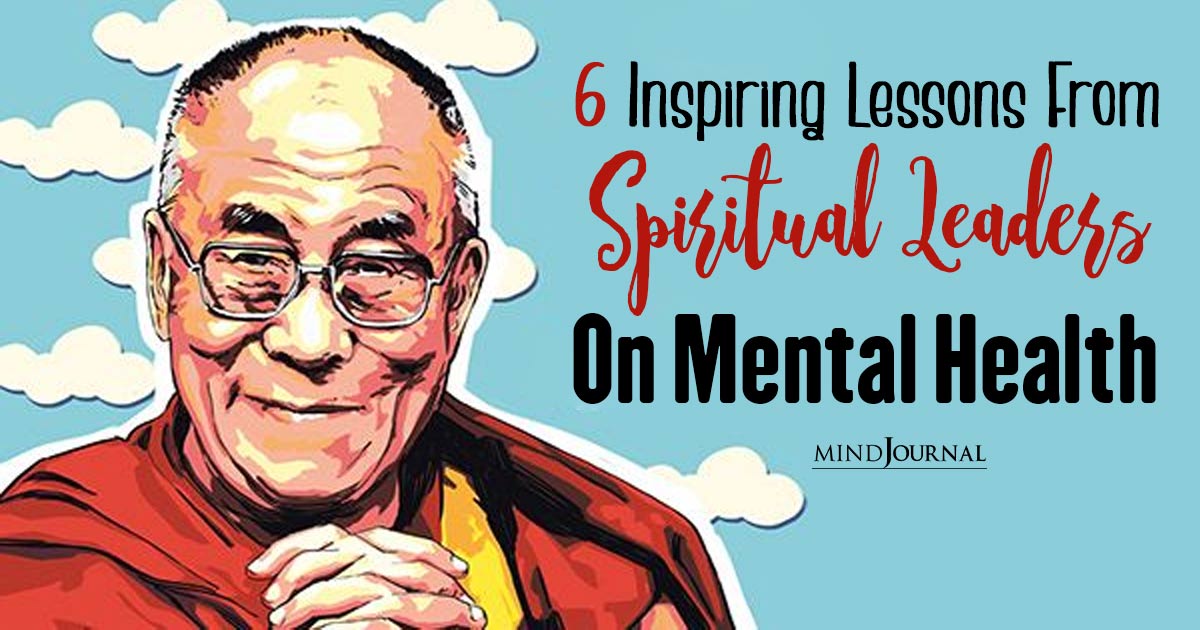
Leave a Reply
You must be logged in to post a comment.